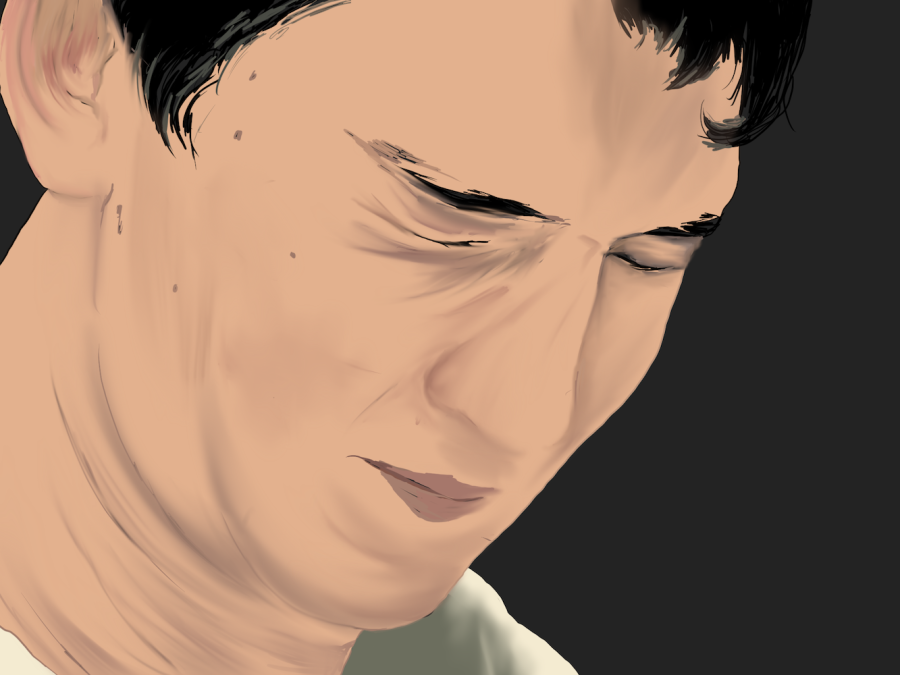The case against ‘Whiplash’
We made a huge mistake giving this guy an Oscar.
(Illustration by Aaliya Luthra)
February 20, 2023
Nowadays, film discourse exists in a precarious space. From the film discussion side of Twitter, to YouTube video essays, to Letterboxd discussions, people tend to get evangelical about certain movies, to the point where a binary idea of correct and incorrect opinions — an oxymoron in and of itself — seems to emerge.
From a practical perspective, this ever-growing tendency is bad for movies. It’s detrimental for creativity, and it discourages people from engaging with art on a more personal level because they often already know what to think about a film before they’ve even seen it.
The supposed goodness of the modern film bro’s treasured “Whiplash,” directed by Damien Chazelle, plays a central role in contemporary cinematic culture. For proof, one need look no further than the most popular reviews on its Letterboxd page, which is overloaded with ratings that rarely venture below four stars out of five. It’s a somewhat surprising development, then, when we see how Chazelle has finally faced somewhat of a reckoning with his latest film “Babylon” — a film that has made only half of what it cost to make at the box office. “Babylon” has divided critics and audiences alike, and while one could chalk it up to an overwrought runtime, alleged poor marketing or being a plain misfire, one thing is for certain: We would never have been subjected to the film if we stopped Chazelle at “Whiplash.”
Like most people around the year 2014, I enjoyed “Whiplash.” I thought J.K. Simmons’ portrayal of an admittedly funny yet cruel and abusive teacher named Terence Fletcher was fantastic. I thought Chazelle’s direction was energetic, precise and bold. I thought that the whole thing was proof you didn’t need a big budget to make a visually arresting film. While I still think my first point is more or less true — his delivery of the “Happy Meal” line still gets me — the latter impressions have been thoroughly disproven in my subsequent revisitings over the years.
“Whiplash” concerns a developing feud between a young, talented drummer and his cutthroat mentor. The mentor terrorizes the former with the hopes that he betters himself as a musician in an intense, albeit ridiculous, study of the troubles artists will subject themselves to in order to achieve remembrance. In a notable scene, we witness our protagonist, Andrew Neiman (Miles Teller), breaking up with his girlfriend Nicole (Melissa Benoist), as he feels she’d be holding him back from “being one of the greats” of jazz music. It’s a sacrifice that has next to no impact on the audience, as the relationship has received no development at all since we last saw them — which is to say since their first date.
This is part of the high cost that Neiman must pay for his pursuit of greatness, a greatness that is defined not by creative genius but by technical mastery. Throughout the film, Neiman shows little in the way of the requisite creativity for his ambition. The only inkling we see of it is a rather mediocre, unprompted drum solo at the end of the film that more so stands out for its representation of a long-deserved rebellion against Fletcher rather than its musical talent. For nearly all of the film’s runtime, Neiman dedicates his time to becoming a human MIDI device — an avatar of mechanical reproduction, a sheep spitting out whatever outdated slop he’s fed. This may also be giving him too much credit — at least MIDIs allow for some added, artificial swing if so desired.
Chazelle’s energetic direction can actually be seen as cold and egotistical. The moving angles are machine-like, and the fast, speedy cuts are enough to afflict you with the film’s titular injury. Based on Chazelle’s own time in a high school jazz band, the plot now becomes noticeably full of wish-fulfillment, self-inserts and personal venting. Go watch the dinner scene again with Neiman and his family and try to tell me that it’s not just a re-enactment of an actual confrontation Chazelle had. The only difference is that now he’s able to use all the comebacks he wished he had at the time.
This self-indulgence makes up the core of Chazelle’s identity as a filmmaker. He obsesses with attempts to replicate the spirit of old Technicolor Hollywood musicals in “La La Land.” Not only does he fail to bring anything new to the table by pursuing this spirit, but he also fails at his goal of bringing back the elaborate musical. His dance numbers are both simplistic and lack the over-the-top extravagant panache that marked the numbers in classics like “An American in Paris” and “Singin’ in the Rain.” He attempts to recreate the latter in his latest film, “Babylon,” a three-hour jerkfest that justifies another sacrifice — that of life itself — in pursuit of wild dreams. It’s written with all the skill and melodramaticism of a 16-year-old who lurks on the subreddit r/movies and just found the courage to post on Wattpad.
“Whiplash” is where it all started. Its popularity with film bros and buffs alike is no mystery — it’s a movie that tells you that you don’t have to play nice with anyone because you have better places to be, that your own sense of self-importance and immersion in your fantasy world is not only justifiable, but necessary. Screw doing anything new, just shut up and play the hits. That’s what they’ll all eat up anyway, right?
Contact Andre Garcia at [email protected].
























































































































































